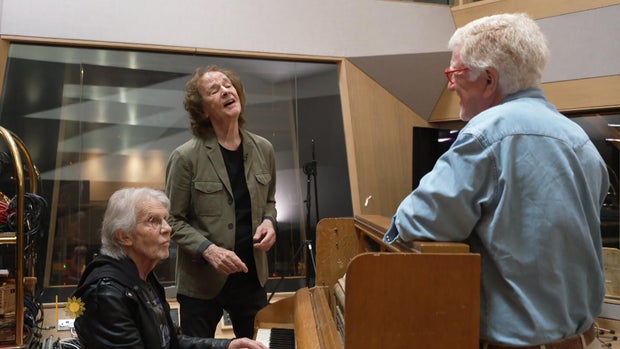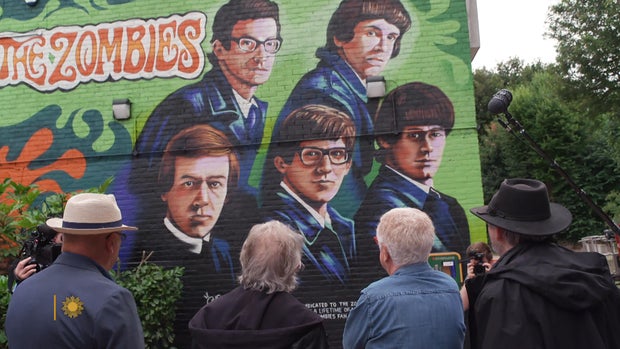The Zombies and their bumpy road to rock 'n' roll immortality

Remember when radio DJs used to say a hit song was "number one with a bullet"? Well, this one was the slowest bullet in rock history. "Time of the Season," by The Zombies, released in March 1968, reached #3 on the Billboard charts a full year later.
Rod Argent and Colin Blunstone are in their 80s now. In their teens they were members of The Zombies, part of the 1960s British pop invasion that began with The Beatles, except that, for The Zombies, success took a lot longer to catch up with them.

Of the five original Zombies, four survive: Argent, Blunstone, Hugh Grundy and Chris White. The fifth member, Paul Atkinson, died in 2004.
"We were friends, really, right from the very start," said Agent.
"It just clicked, yeah, it really did," said Grundy.
White added, "And we're still friends!"
They first got the band together at a youth club in their hometown just north of London, where a local artist has now finally put up a mural of them.

But boy, was it a bumpy road to rock 'n' roll immortality.
The first song Argent wrote was "She's Not There," about unrequited adolescent love (is there another kind?). It was the making of them.
"She's Not There" made it onto "Juke Box Jury," a British is-it-a-hit-or-a-miss TV show, where one of the panelists loved it: "I think it's a hit," he said. That panelist was George Harrison of The Beatles. It didn't hurt.
The song went to #1 on the Cash Box chart, and #2 in Billboard.
"It was on the 9 o'clock news," said Argent. "They said The Zombies had become the first group after The Beatles to have a number one record with a self-written composition" - the song Argent wrote - "Yeah, I'm in heaven!."
"She's Not There" wasn't just a hit; it was their ticket to ride. They went to America, and hit the road with the Dick Clark Caravan of Stars. "This was a dream come true for us," said Blunstone.
Grundy said, "We were terrified because here we were taking a lot of their influence, and there we were on stage with these fabulous artists going, 'Can we do this, can we even play with them?'"
I asked, "Do you feel you were being imposters bringing American-style rhythm and blues music back to America?"
"With English accents!" said White.
"We thought exactly that," Argent replied. "But they saw us as doing something really quite different. But we realize now that we did really have something quite original. We really did have our own stamp."
But there was a problem: Money. There wasn't any.
Blunstone said, "We were 19 years old, we were very naïve, and we didn't realize what our options were. So, I'm afraid that touring revenue was poor. Sometimes non-existent!"
Not only that, they felt their music had stagnated and suffered. They decided to produce their own album, in their own way. They went to the mothership of British rock, the famous Abbey Road Studios in London.
Returning there, Blunstone said, "You do get this really emotional feeling walking into it. Because, I mean, there's so much history in these walls."
The session produced what became their signature album, "Odessey and Oracle," now considered one of rock 'n' roll's greats. But not then. Then, it sank without a trace. "There was no real interest in us," Argent said.
Blunstone said, "I thought we had a chance, but it became fairly clear fairly quickly that the industry pretty much ignored it, really."
The Zombies thought it was all over and broke up. Blunstone took a job in insurance. Grundy sold cars. White and Argent wrote songs for other people, including this one for Argent's new band: "Hold Your Head Up."
But "Odessey and Oracle" wouldn't die. More than a year later, one of the tracks, "Time of the Season," started to get some play.
"Famously there was one DJ in Boise, Idaho who kept playing 'Time of the Season,'" said Blunstone. "It spread to other radio stations. It took months for it to be a hit, but again, it went to number one in Cash Box."
Finally, more than 50 years after their hits, The Zombies made it into the Rock & Roll Hall of Fame; and now, a remastered version of "Odessey and Oracle" has been released.
"Now," said Blunstone, "it gets name-checked as a major influence in so many people's careers."
"Considered a Top 50 rock album, iconic rock album," I added.
"I know! And here we are. Is it nearly 70 years later? It's a very strange story."
But a story with a happy ending. For The Zombies, their season has finally come.
You can stream the remastered 1968 Zombies album "Odessey and Oracle" by clicking on the embed below (Free Spotify registration required to hear the tracks in full):
For more info:
Story produced by Mikaela Bufano. Editor: Brian Robbins.
Mark Phillips is the CBS News senior foreign correspondent and has been based in the London Bureau since 1993. He has covered every major international story of the past 35 years, including conflicts in the Middle East, Africa and Europe.
Cbs News





